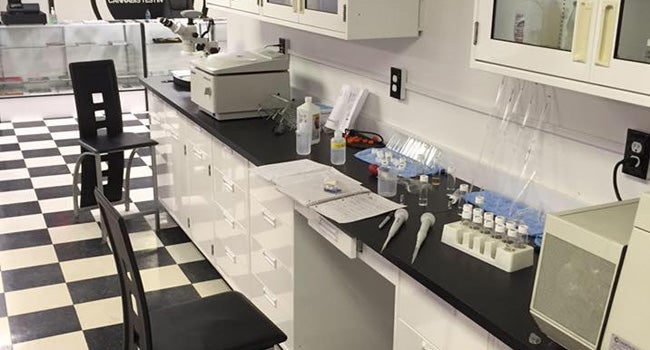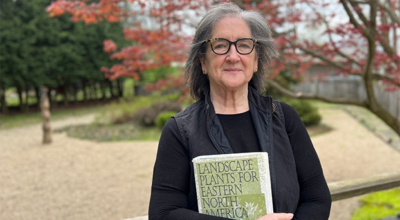CLOSER LOOK: Testing facility an example of a potential marijuana business
Published 10:00 am Thursday, July 6, 2017

- Spott Laboratory, in Kalamazoo, is a testing facility that evaluates marijuana before it is sold medicinally in Michigan. Testing facilities are one of many types of businesses that may open in municipalities permitting medical marijuana industry. (Submitted photo)
At Spott Laboratory, owner Linda Palmatier seeks to help medical marijuana facilities provide the cleanest and safest medical marijuana to patients relying on the drug for pain relief.
Palmatier opened the business in Kalamazoo in 2014.
After retiring from a career as a secretary and accountant, she decided to try her hand at opening a medical marijuana dispensary.
Her son Dan, who now serves as a director of sales and marketing for the business, said his mom wanted to help people with medical marijuana.

“What kind of [encouraged her] to get into it was realizing the benefits of medical marijuana, once she saw what it can do. [For example] for those with Parkinson’s or children with seizures,” Dan said.
But road blocks from the city, which forbade medical marijuana dispensaries in Kalamazoo, almost forced her to consider other retirement plans, Dan said.
Instead, she decided to focus on building a medical marijuana testing laboratory, which could “spot” potentially harmful factors in a weed product.
Medical marijuana testing facilities are one of the many types of operations elected officials have been investigating since a package of laws was enacted in December 2016.
At Spott Laboratory, scientists test samples of medical marijuana in the form of flowers, extracts, edibles, leaves, topical products and other forms. The tests can evaluate the product for deficiencies, such as molds, mildews, pathogens and residual solvents, to name a few.
Besides contaminants, the tests can reveal to the grower the plant’s potency, gender, taste and the amount of THC versus cannabinoids.
The certified lab tests samples across the state and has drop off locations from South Haven to Detroit and north of Grand Rapids. The samples are collected twice a week. Results can be available in 24 hours and emailed to the sender.
Under current law, the State of Michigan does not require medical marijuana facilities to test their products, Dan said. That does not mean business owners should bypass the use of laboratory testing, though.
“If somebody is growing in a basement that has black mold, for instance, and that mold gets on the plant and somebody smokes that product, that could cause a lung infection [or] severe health problems,” Dan said.
The facility currently has four scientists who operate the tests. Each has earned a master’s degree in their scientific field.
While the facility does not background test employees, according to Dan, each must also have knowledge of the cannabis industry, in addition to a master’s degree.
At an average cost $50 to $60 per sample, tested products are extensively examined. While the process varies depending on the test initiated, every sample that is received undergoes a microscopic inspection from a biologist, trained to observe visual contaminants, such as aphids, human hair or plastic pieces.
Once that is completed, a photo of the sample is taken and any spotted contaminants are highlighted. Next, the sample could go to a gas chromatography machine that has the ability to test the sample’s potency and terpenes, which, much like a fine wine’s tannins, can indicate the subtleties of a the plant’s taste and smell.
The lab also has an ultra-pressure liquid chromatography machine, which can extensively examine the molecular structure of the plant.
For facilities brewing up big batches of medicinal product, the cost could be well worth it.
“[While] it is not required, some dispensaries that we work with make it a goal to test everything that comes in there because they understand and support testing. [Those facilities] are the ones that actually do it for the patients,” Palmatier said. “As opposed to some dispensaries that are in it for the dollar, just to sell weed.”
While Dan himself does not smoke medical marijuana, he is a user of medical marijuana edibles. Dan said he was in a bad car accident during high school. After the accident, he was forced to use a cane for some time and was left with crippling insomnia until he started using edibles to help.
As both a user and insider in the industry, Dan said the process to obtain medical marijuana after one has properly received a card is much like a visit to the doctor.
When visiting a dispensary, users first must present their identification and medical marijuana cards.
They are then seated in a waiting room, until the budtender is available. Once inside a separate room with the marijuana products, a budtender will ask users about their ailments and try to match a product that is best for that pain.
When considering what products to purchase, Dan advised medical marijuana users to ask their dispensary if they test their products.
Since Spott opened in 2014, there has been avid community support, curiosity and some skepticism.
“The way that they looked at cannabis before was [it is] bad,” Dan said. “They had no idea why. They did not really see the actual side of things. [Then] they realized how seriously it could help a lot of people and how important it was to be clean.”
City council members from Kalamazoo and Portage, as well as state representatives, have visited the facility wanting to know more about how it operates.
Dan said the lab invites the questions and hopes to help educate people more on what they do and how medical marijuana can be utilized as a medicine.
“We have nothing against that,” Dan said. “We have no problem sitting down. We are open minded. We believe there is always two sides to a story and we just want to share ours.”






